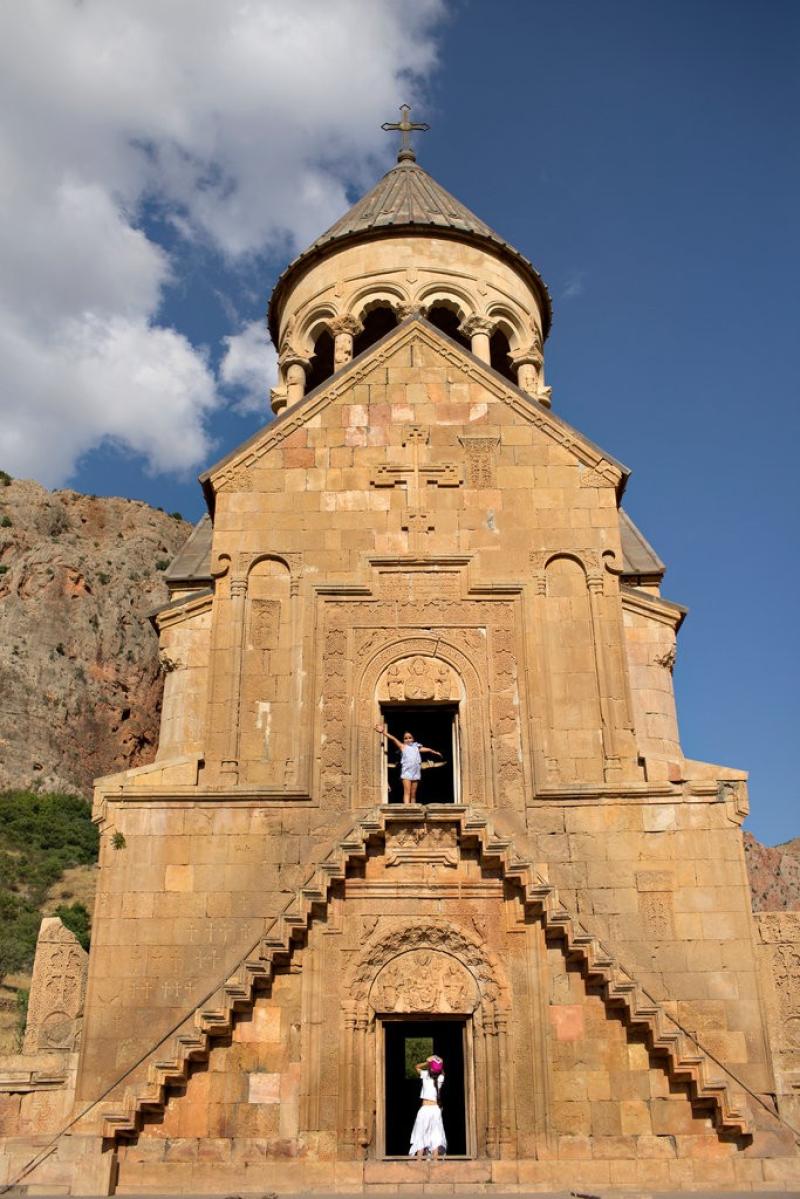My Armenia - by Peter Balakian


Like its cuisine, the country has a long, rich history. Armenia, which became an independent republic in 1991 after the fall of the Soviet Union, is a small, landlocked nation in the southwest Caucasus, at the crossroads of Europe and Asia. The country today is what remains of a once-ancient empire that stretched from the Mediterranean to the Caspian Sea in the first century B.C., before it was conquered by the Romans. It was the first nation to make Christianity its state religion, in 301.
Conquered by Byzantines, Persians, Mongols and Seljuks, then colonized by the Ottoman Turks in the 16th century, Armenians were subject to large-scale massacres in the 19th century, during the reign of Sultan Abdul Hamid II, and were the victims of what genocide scholars regard as one of the first genocides of the modern era, by the Ottoman Turkish government in 1915. (Turkey denies that the killings were genocide.)
Peter Balakian is the author of the Pulitzer Prize-winning poetry collection “Ozone Journal,” and “The Burning Tigris: The Armenian Genocide and America’s Response.” He teaches at Colgate University.










Take a tour through the nation of Armenia through Peter Balakian's article.
Enjoy Balakian's descriptions of Armenia, its history, and its exquisite cuisine.
Dear Friend Jasper: Will certainly do later tonight.
On my way to pay condolence calls now.
E.
I was hoping that you'd be among those who would see this seed, my friend. Part of my wife's ethnicity is Armenian. I've learned a lot of Armenian history, the Armenian Genocide, and embraced the cultural food, music, and dance from her family. I've read some of Peter Balakian's books and have attended some of his lectures.
When you have time, please give me your thoughts about this article.
Excellent and informative article.
I found this to be especially interesting.
I would not have guessed that type of bird life exists in Armenia.
Thank you for commenting, Kavika. My wife's ethnicity is Armenian, so I have had a special affection and desire to learn about this country. Family and friends have been very instrumental in my learning about Armenia and its culture.
No need for thanks, it was a great article. I love these types of articles where we can learn something about other cultures and peoples..
Keep them coming, if I see them I read and comment.
Dear Friend Jasper: Sorry I could not get to this earlier, and give it the attention it deserves.
Today was a busy day for me.
While I want to spend more time with Professor Balakian's works, I am with confidence able to contribute this now.
In my mind, there is no question but that what Turkey did to the Armenians was Genocidal.
The history, the cross corroboration of evidence is by objective third party's is clear and beyond spin doctoring on what happened.
Regrettably, the need to cozy up to Turkey over address what happened to Armenia due to Turley's position in that region and the world has lead too many, our USA included not to address this in a way ethics and international law demand.
Perhaps at this point in time there may be an opportunity for America to take the high moral ground here.
One can only hope.
At least, an appropriate recognition of what happened, and pressure for some form of restitution is in order and can happen.
Enoch.
Thank you for returning to share such a thoughtful comment.
Tens of millions of people agree with you. I really don't want to make this seed too political, so I'll simply add that it's very telling that not one US president in over 100 years has called to task what the Turks did to Armenians and other "infidels" (including Jews) and none of them formally proclaimed the Armenian Genocide as such.
There aren't many Armenian descendants who want monetary restitution. They simply want the US government to formally declare that what their ancestors suffered was, in fact, a genocide .
If you haven't already done so, please read Henry Morgenthau, Sr.'s notes, letters, and articles. Many were published by the New York Times and are in their archives. He was the Ambassador to the Ottoman Empire. A generation later his son, Henry Morganthau, Jr., was equally influential when he exposed the atrocities of the Holocaust.
History is always good to discuss and Armenia does certainly have a deep rich history. Thank you for this article. Very enjoyable.
I can't remember what it was called during the time of the Hittite empire. And of course, a good while after the Trojan wars, those country bumpkins in the north of Greece led by that upstart name Alexander marched right through the area too. Sorry for jumping around chronologically, just the way i recalled while tying.
More recently, the Crimean war in the mid 19th century engulfed that entire region. Oddly that war gets very little mention in history. Not long after that, around the WWI period is when the Turks began their genocide against the Armenians. Being Armenian and Kurd in that region carries a lot of unfortunate history.
Your wife must be pleased that you show this interest in learning about her country. This is another one of those areas where you realize the more your dig, the more you realize how little you know.
EDIT:
I removed this portion from above as I was thinking about the other side of the Black Sea. It is still interesting history. Just on the other side of the water. Oh well.
I'm glad you enjoyed it and thank you for commenting. It wasn't until I was out of school that I started realizing how little I knew about world and US history and how important the past is in relation to our "present" and "future".